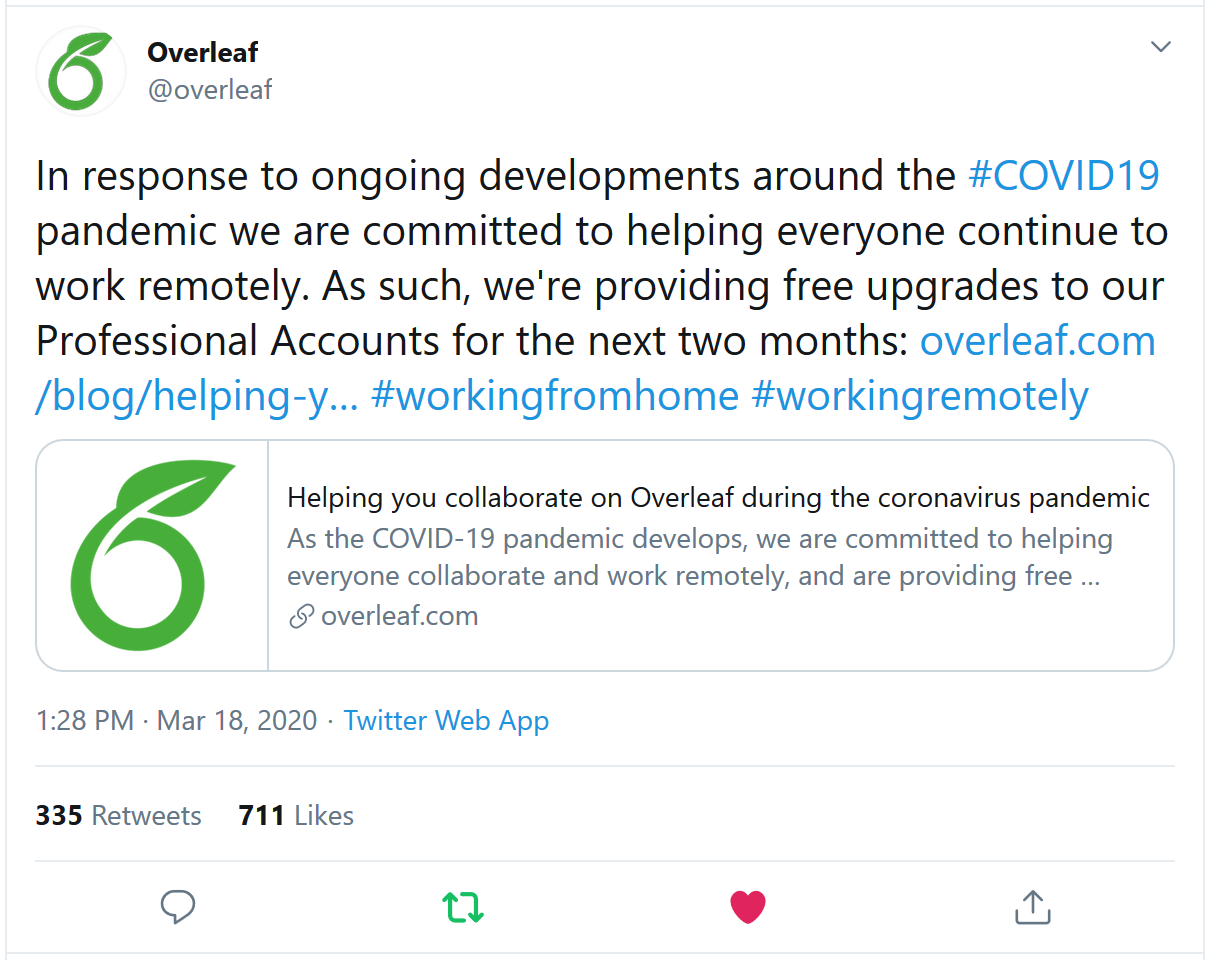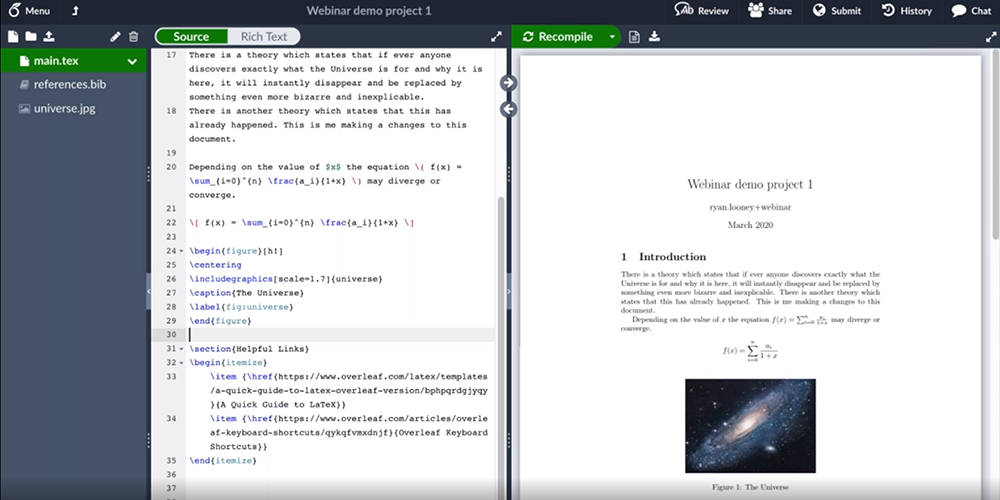Helping you and your team work from home
John · April 22, 2020June 20th Update: At the start of the Coronavirus/COVID19 pandemic, we introduced a temporary free upgrade programme as our immediate response. This programme ran for three months covering April-June 2020, and helped over 45,000 people use Overleaf more effectively during this time. The registration period for this free upgrade has now closed; users who have already taken up the free upgrade will continue to see it applied to their account until the end of June 2020.
To help you to continue to collaborate throughout 2020 and beyond, we are continuing to provide additional support and initiatives. For more information, please see https://www.overleaf.com/events/wfh2020.
May 28th Update: We've extended the WFH2020 free upgrade to run until June 30th 2020. We're also providing specially discounted annual plans to help you continue collaborating throughout 2020. Find out more.
As much of the world continues in lockdown, we wanted to update you all on what we’re doing to help you work from home during the global Coronavirus pandemic.
In addition to the free account upgrade we announced last month, we’ve started to host a series of webinars on a range of topics. You can find out more about both of these initiatives below.
We also wanted to say thanks to you all for helping each other during this time—we’ve seen lots of positive messages of support over the past few weeks, and we’re glad to be supporting the student and research communities where we can.
Free upgrades to Overleaf Professional—join the WFH2020 group

Last month, as more and more of the world’s population found itself working from home in an effort to help slow the spread of the Coronavrius, we decided to make the full collaboration features of Overleaf available to anyone who needs them, via a special WFH2020 group.
Since then, over 1,400 people have taken up this free upgrade worldwide, including over 350 PhD students, and we wanted to take this opportunity to remind everyone that this upgrade is available if you need it.
My colleague Ryan has been managing the WFH2020 group on Overleaf, adding new users in batches every day and sharing the messages you’ve included on the form with our team. Out of the 1,400 who have joined the group so far, over 400 of you also left messages of thanks, as Ryan discusses below:
When John proposed that we find a way to accommodate users who suddenly found themselves needing to collaborate, I volunteered for the task of establishing and maintaining what is now called the WFH2020 group. Each day, I gather the new emails from the form we've set up, and invite those addresses to the group. It is the daily task I look forward to the most! I've been overwhelmed by the messages of gratitude that have come in along with those email addresses.
It's humbling to have people take the time to leave a message of thanks, when we're all stretched thin and busier than ever. It may come as a surprise that we're handling this so manually, but as with all things Overleaf, we're very much people-focused. I manage our small and mighty support team, who support >1600 individual users each month. Every message gets read by a person, and it is delightful whenever we can make a human connection. As we're all more physically isolated now, seeing these messages each day is a joyful reminder of those connections.
Some of the messages we've received remind me that Overleaf is privileged to be part of the most important work of people's lives:
"I'm finishing my PhD. Thesis and the professional licence will be very helpful, since I just have two months to the defense."
They also remind me that important scientific discoveries and communication happen with Overleaf:
"We're dedicated to help the ongoing research on Covid-19. We are collaborating from all over the world."
"We started a 30-people collaboration on the mathematical modelling of coronavirus physiology." "
So many people have shared a little bit about the work they've been doing on Overleaf, and I appreciate each and every one of those messages, from the person digitizing their ancestors' memoirs, to the climate researchers, to the students who are just getting started.
And of course, a hearty thanks is always a welcome message -- "you are the best, this will help me a lot!" Thank you to the Overleaf community, for all you have trusted us with, and for the work you've done and continue to do.
Read more details about the upgrade offer in our original blog post, or simply request your free upgrade here.
Overleaf Webinars—30 minute introductions to help you get started

If you’ve never used Overleaf before, or know someone who is just starting out, we’ve been hosting and recording a series of webinars to help you get started.
So far, we’ve covered the first two parts in a three-part introduction to Overleaf, along with an introduction to teaching with Overleaf. The webinar recordings are available here, and we’ll be continuing to record several more in the weeks ahead, including the third part of our introduction series - Advanced Features - we've got others in the pipeline - all details will be posted on our webinar page.
If you’d like to join an upcoming webinar, please follow us on Twitter to receive the announcements, or check out our webinars page for past recordings.
Other initiatives from Digital Science
Overleaf is also proud to be part of Digital Science, an organization that is helping to support the research community in many other ways during this crisis. Digital Science have put together a summary of these different initiatives, and if any of these are also of use to you and your colleagues, please feel free to share them in your teams.